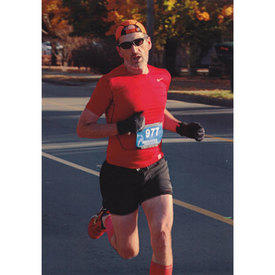Newb Pacing Question

BChanFit
Posts: 209 Member
Trying to build up my miles per week to prepare for marathon training in the Spring. I've also been doing a lot of reading on marathon training. Most of the literature seems to recommend a slow (slower than race pace) pace for long training runs. I am just not understanding how setting the bar this low will help prepare for the speed you want on race day. Wouldn't you at that point only be able to do what you've been practicing? Everything I read also seems to recommend not going out too fast so I'm just trying to juggle all of this in my head. I have about 10 months left which should be enough time to prepare I just want to make sure I'm doing it right since I have the time to put in. If anyone has any advice or resources that explains better I'd really appreciate it. 
0
Replies
-
There has been volumes of information written on this subject, so I'm not going to re-invent the wheel here. The training you are reading about is all based on the principles developed by Arthur Lydiard over a half a century ago.
This is a good synopsis. Sorry about having to click through the Runner's World ads.
http://www.runnersworld.com/race-training/training-lydiard-way-28-weeks-pr
Bottom line is, you have to build your aerobic base before you can build anything else.
Real world example. My easy run and long run pace range between 8:45 and 10:00 per mile.
My marathon PR is a 3:10. That's a 7:17 pace.
It works.0 -
I am reading Matt Fitzgerald's book "80/20 Running" and he talks about the same thing.0
-
Most modern distance coaches are Lydiard disciples. There are very few exceptions and their athletes aren't winning races.0
-
My coach had me do a few long runs with half of the mileage (or more) at goal marathon pace. That helped me get a good feel for sustaining that kind of pace. But overall I was usually running a 9:30 pace and my marathon last weekend (my first) was a 8:39 avg pace.0
-
I am also using the 80/20 plan (highly recommend getting the book) and it works. I had the same concerns as you when I started. Prior to starting the plan, I was doing most of my runs at 8:30-9 min pace. It was a challenge to slow down at first. But I slowed most of my foundation and long run paces down to 9:15-9:40. After about 6 weeks I went our and ran a half marathon PR @ 7:56 pace. I was shocked. When you follow this approach, you give your body more time to recover and you get much more out of your high intensity (tempo, interval) runs.0
-
Thanks everyone! I will check out the books and links you recommended as well. So much information.0
-
Another comment for the easy rule. My running is probably 90/10, as that's what was hammered into my brain by a wise fellow on this thread. Has it worked? In the past year, I took 60min off my marathon, 10min off my HM, 3min off my 10K, and 1min off my 5K.
My everyday training pace was 9:00-9:15 for these results, and in Sep, I upped it to 8:30-9:00 because my heart rate wasn't getting high enough and my training was kinda due for an overhaul given my PRs.
Does it feel like I'm going slow? Yep. Do I recover quickly? Yup. Because of that, I'm able to get in the volume I need while minimizing risk of injury.0 -
CarsonRuns wrote: »There has been volumes of information written on this subject, so I'm not going to re-invent the wheel here. The training you are reading about is all based on the principles developed by Arthur Lydiard over a half a century ago.
This is a good synopsis. Sorry about having to click through the Runner's World ads.
http://www.runnersworld.com/race-training/training-lydiard-way-28-weeks-pr
Bottom line is, you have to build your aerobic base before you can build anything else.
Real world example. My easy run and long run pace range between 8:45 and 10:00 per mile.
My marathon PR is a 3:10. That's a 7:17 pace.
It works.
Any tips for slowing down? I just try to run "easy" a lot of the time, but I usually end up running 8:00-8:20/mile. And I'm not near as fast as you. I think I could maybe average 7:40 over a half marathon right now.0 -
SecretAgent27 wrote: »Any tips for slowing down? I just try to run "easy" a lot of the time, but I usually end up running 8:00-8:20/mile. And I'm not near as fast as you. I think I could maybe average 7:40 over a half marathon right now.
What kind of mileage are you running? Are you just doing easy runs, or are you doing speed work as well? If you have a GPS watch you can set it to alert you when you are going too fast. It's also possible you are running an appropriate pace and could actually do much better than 7:40 for a half. I'd suggest entering a 5k, going all-out, and seeing what your current time is. Then plug that into a calculator like mcmillanrunning.com and it will give you your training paces.0 -
I have found that joining a group that is slower than you can help a lot. Just put yourself near the middle of the pack and enjoy the conversation.0
-
SecretAgent27 wrote: »
Any tips for slowing down? I just try to run "easy" a lot of the time, but I usually end up running 8:00-8:20/mile. And I'm not near as fast as you. I think I could maybe average 7:40 over a half marathon right now.
Run as fast as you can but still able to recite your ABC's or sing the Happy Birthday song out loud without having to gasp for a breath. It is what they call conversational pace.
More volume not fast builds up your speed. Now you can throw in special workouts like tempo's, lactate threshold runs, speed training, strides, ect... but they make up a small percentage of your weekly milage. ~70% of your weekly distance should be at conversational or slower.
To answer OP's question. Not a single workout will make you faster for your race, but different workouts that target different aspects of your running all working together. If you go all out on too many workouts, then it will negatively effect your other workouts. https://www.youtube.com/watch?v=veAQ73OJdwY 0
https://www.youtube.com/watch?v=veAQ73OJdwY 0 -
SonicDeathMonkey80 wrote: »Another comment for the easy rule. My running is probably 90/10, as that's what was hammered into my brain by a wise fellow on this thread. Has it worked? In the past year, I took 60min off my marathon, 10min off my HM, 3min off my 10K, and 1min off my 5K.
My everyday training pace was 9:00-9:15 for these results, and in Sep, I upped it to 8:30-9:00 because my heart rate wasn't getting high enough and my training was kinda due for an overhaul given my PRs.
Does it feel like I'm going slow? Yep. Do I recover quickly? Yup. Because of that, I'm able to get in the volume I need while minimizing risk of injury.
This...is bang on!0 -
SecretAgent27 wrote: »CarsonRuns wrote: »There has been volumes of information written on this subject, so I'm not going to re-invent the wheel here. The training you are reading about is all based on the principles developed by Arthur Lydiard over a half a century ago.
This is a good synopsis. Sorry about having to click through the Runner's World ads.
http://www.runnersworld.com/race-training/training-lydiard-way-28-weeks-pr
Bottom line is, you have to build your aerobic base before you can build anything else.
Real world example. My easy run and long run pace range between 8:45 and 10:00 per mile.
My marathon PR is a 3:10. That's a 7:17 pace.
It works.
Any tips for slowing down? I just try to run "easy" a lot of the time, but I usually end up running 8:00-8:20/mile. And I'm not near as fast as you. I think I could maybe average 7:40 over a half marathon right now.
How many days per week are you running?0 -
I also have trouble jogging slower than a 9:30 pace on any runs, training for my first HM in a while Dec 13. My 2014 5K PB is 25:36 and I run 3-4 times a week, the longest 12 mi now. I plan to do a long run (12-14 mi) the next two weekends then taper the first two weeks in Dec. What should my 12-14 mi pace be? I'm only slightly out of breath after singing the ABCs on my long run 9-9:30 pace so am I still going too fast considering how often I run? I would like to do a sub-2 13.1 in a month and any opinion is appreciated. I plan to enjoy the race even if my time is more than 2 hrs.
 0
0 -
I also have trouble jogging slower than a 9:30 pace on any runs, training for my first HM in a while Dec 13. My 2014 5K PB is 25:36 and I run 3-4 times a week, the longest 12 mi now. I plan to do a long run (12-14 mi) the next two weekends then taper the first two weeks in Dec. What should my 12-14 mi pace be? I'm only slightly out of breath after singing the ABCs on my long run 9-9:30 pace so am I still going too fast considering how often I run? I would like to do a sub-2 13.1 in a month and any opinion is appreciated. I plan to enjoy the race even if my time is more than 2 hrs.

I used your 5K PR along with my age/weight/height/resting HR in this magical calculator >>> http://www.electricblues.com/html/runpro.html
What I see is that a sub-2 HM is entirely possible, and that 9-9:30 is pushing your % of HR max into the high 70s/low 80s, which is why you're getting out of breath. A training pace that will put you in the low 70% of your HR max would be between 10:20-11:00.
You should realize that a 1:57 HM is a 9:00 pace, and you absolutely, positively, should not be doing your training runs at that pace. You will be trashed come race day, I promise. Save that for the last 25% of your final long run and execute a fast finish.0 -
^^^ Listen to him, and learn how to run slower in training. If your watch has it, use the pace alerts to tell you when you're going too fast.0
-
The spreadsheet on that page (http://www.electricblues.com/html/runpro.html) is like porn to an engineer.

For some reason, I don't like to get that quantitative about my running but it is very interesting! Thanks for the link. I need to lose more weight and run slower on my long runs. Hoping to improve for my next half marathon in April.0 -
I sincerely appreciate the timely advice. My Garmin Forerunner 10 has a virtual pacer that I plan to set to 10:30 for both remaining long runs. Is it ok to run my 2-3 other weekly runs at 9-9:30 or tempo pace ? If variety will help me get a sub-2 HM Dec 13, I'd do fartlek once a week but am not currently interested in precisely measuring interval distances. I'd be open to doing timed intervals (3 min threshold pace, 1 min recovery pace, repeat 5 times) if I knew a good threshold/recovery pace range for intervals. Thanks again!0
-
I sincerely appreciate the timely advice. My Garmin Forerunner 10 has a virtual pacer that I plan to set to 10:30 for both remaining long runs. Is it ok to run my 2-3 other weekly runs at 9-9:30 or tempo pace ? If variety will help me get a sub-2 HM Dec 13, I'd do fartlek once a week but am not currently interested in precisely measuring interval distances. I'd be open to doing timed intervals (3 min threshold pace, 1 min recovery pace, repeat 5 times) if I knew a good threshold/recovery pace range for intervals. Thanks again!
Hopefully this doesn't break (it broke, gonna have to sort out paces yourself):
Tempo paces (+/-5sec)
20 min 25 min 30 min 35 min 40 min 45 min 50 min 55 min 60 min
8:39 8:46 8:51 8:53 8:56 8:59 9:02 9:05 9:08
2.3 mi 2.9 mi 3.4 mi 3.9 mi 4.5 mi 5 mi 5.5 mi 6.1 mi 6.6 mi
As far as your intervals, you could do 4-6x 400M intervals at 5K pace (8:12) with 200M rest, 2-4 800M at 10K (8:33), and/or some 1600M at 10K. Just be sure to do a proper warmup/cooldown. My biggest mistake was going all out for the track - hit your various race paces and nothing more.
I'd do a day of trackwork and a day of tempo/hillwork, plus your long run to comprise your week's "hard" work. Fill the rest in with easy running at the 10:20-11:00. Too much pacework will hinder your recovery and race day performance. You might not feel like it, but it will affect you.0 -
SonicDeathMonkey80 wrote: »I'd do a day of trackwork and a day of tempo/hillwork, plus your long run to comprise your week's "hard" work. Fill the rest in with easy running at the 10:20-11:00. Too much pacework will hinder your recovery and race day performance. You might not feel like it, but it will affect you.
This exactly. I know it's hard to slow down, but you have to make yourself do it. Yes, it will mess with your confidence (and ego), until your run that first race at a pace you never could have imagined. Everyone on this page giving you this advice has run HMs way under 2 hours, so that should tell you something. Again, I highly recommend picking up a copy of Matt Fitzgerald's "80/20". It will explain the physiology and psychology behind this logic.
0 -
Count me in as another person who can run a sub 2 hour half marathon and the bulk of my training falls in the 10:30-11:00, even slower (significantly) than that at times because a third of my week is spent on trails.0
-
Add me to the list of those who can/did a sub 2hr HM with the bulk of my training between 10:30-12:00 for the 3 or 4 months leading up to it.0
This discussion has been closed.













